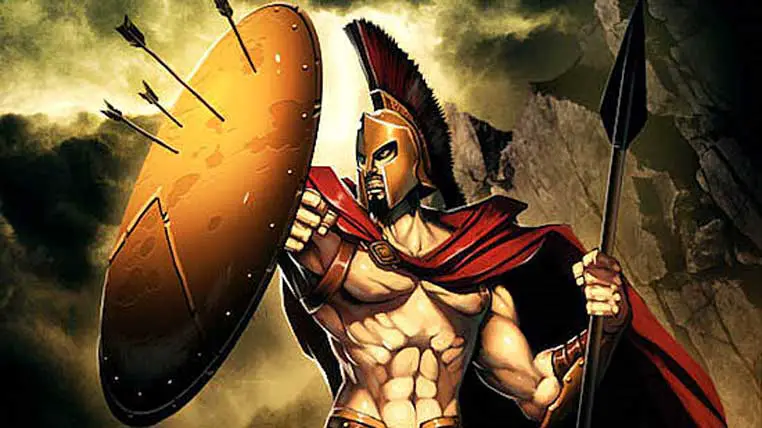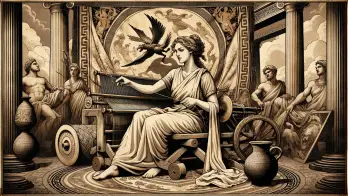Among the twelve Olympian gods who resided on Mount Olympus, Ares was the offspring of Zeus and Hera. Despite his crucial role as the god of war, the other gods and goddesses did not universally admire or beloved him.
The god of war was typically portrayed as impulsive, quick-tempered, and prone to violence, even outside the battlefield. Moreover, he was often regarded as being less intelligent and strategic than other gods linked with warfare, like Athena.
Although the god of war was not as highly regarded as some other Olympians, he remained a crucial figure in Greek mythology, frequently associated with the cruel and bloody aspects of war.
Etymology
Etymology-wise, the origin of the name Ares is uncertain, but several theories exist.
One theory proposes that the name may have originated from the Greek term “areo,” which implies “to destroy” or “to lay waste.”
This association would be fitting for the god of war, connected with violence and destruction.
Another theory suggests that the name Ares may have been derived from the ancient Thracian language spoken in modern-day Bulgaria, Romania, and Turkey.
The Thracians were a warrior culture known for their ferocious and brutal fighting style, and it is conceivable that the Greeks adopted their god of war from this culture, along with the name Ares.
Furthermore, it is worth noting that Ares was referred to by different names in different regions of ancient Greece.
In Sparta, for example, he was known as Enyalios, while in Thebes, he was known as Ismenios.
Nevertheless, despite these differences, Ares remained a notable figure in Greek mythology and was recognized as the god of war throughout ancient Greece.
Characterization
The god of war was frequently portrayed as a violent and impulsive deity who took pleasure in the disorder and devastation of battle. He was typically linked with the more savage and brutal components of warfare, such as bloodshed and killing.
In contrast to other war deities, such as Athena or Apollo, he was not regarded as a god of strategy or tactical thinking. Instead, he was viewed as a god of physical strength and brute force.
This depiction of Ares as a warrior god who relied on strength instead of intelligence or strategy might have been influenced by the martial culture of ancient Greece, where physical prowess and courage were prized above all else.
Despite being the god of war, Ares was not universally admired or loved by the other gods. In fact, he was frequently seen as a troublemaker who caused more problems than he solved.
In one myth, the gods actually imprisoned Ares in chains for inciting violence and chaos among humans.
His parents, Zeus and Hera, were also said to have a strained relationship with him, with Hera often criticizing him for his brutish behavior and lack of intelligence.
In some legends, the god of war was described by his father as “the most hateful of all immortals.” At the same time, Hera portrayed him as “a madman who knows no law,” and his sister Athena depicted him as “irrational, fickle, and an embodiment of evil.”
Some scholars have also suggested that Ares may have represented a more primal, pre-Olympian aspect of Greek religion that was later assimilated into the pantheon of gods.
This could help explain why Ares was frequently perceived as a more primitive and unsophisticated deity than some other gods associated with more intellectual or spiritual pursuits.
Genealogy
Though Ares plays a relatively limited role in Greek mythology as represented in literary narratives, his numerous love affairs and abundant offspring are often alluded to.
Parents
- Zeus, the king of the gods and the god of the sky and thunder
- Hera, the queen of the gods.
Grandparents
- Cronus, a titan who ruled over the universe until he was overthrown by Zeus and his siblings
- Rhea was Cronus’ wife, sister, and the mother of Zeus and his siblings.
Siblings
- Athena, the goddess of wisdom, warfare, and crafts, and was often depicted as a wise and strategic warrior, in contrast to the god of war’s more brutish approach to combat.
- Hebe, the goddess of youth and was often depicted as a cupbearer to the gods.
- Eileithyia was a goddess of childbirth and midwifery.
- Hephaestus, the god of fire and metalworking and was often depicted as a skilled craftsman.
Wives and lovers
- In some versions of the myth, Aphrodite was Ares’ most famous lover and his wife. Aphrodite was the goddess of love, beauty, and fertility, often depicted as having many affairs with gods and mortals alike;
- Erytheia was a nymph and the daughter of Geryon, a giant slain by the hero Heracles;
- Harmonia, the goddess of harmony and concord.
- Enyo, the goddess of war and destruction;
- Sterope, a daughter of Atlas;
- Otrera, the queen of the Amazons, a race of warrior women.
Children
- Phobos and Deimos were Ares’ most famous children. They were the gods of fear and terror, respectively, and were often depicted as riding into battle alongside their father;
- Harmonia, the goddess of harmony and concord, often associated with marriage and peace;
- Adrestia, the goddess of revenge and retribution;
- Eros/Cupid was sometimes said to be the son of Ares and Aphrodite, although other versions of the myth attribute his parentage solely to Aphrodite;
- Anteros, the god of requited love;
- Himeros, the god of sexual desire;
- Enyalios, a minor god of war;
- Thrax, a god of combat;
- Oenomaus, a mortal king of Pisa.
Myths and Legends
The mythology surrounding the god of war is not particularly extensive, with one of the most commonly encountered aspects being his association with the goddess of love, Aphrodite. In fact, Aphrodite was known as a goddess of war in some cities, such as Sparta.
The Olympians
Despite being the son of Zeus and Hera, the god of war remained as unpopular among the Olympians as he was among the ordinary Greeks.
One of the most famous scenes from the Iliad illustrates the Greek people’s antipathy for Ares, in which the god of war returns wounded from battle, groaning and weeping from his injuries.
But his lamentations do not elicit any sympathy from Zeus, who loses his patience and scolds him so that all the other gods can hear:
You are the most hateful to me of all the gods who hold Olympus since you always love quarrels and battles and fights. Your spirit is insufferable and unyielding, like that of your mother, Hera, whom I can hardly control with my words.
Ares was typically portrayed as a selfish and cruel god. However, these traits never prevented him from defending his mother before Zeus or the other gods.
For example, one myth recounts how Ares compelled Hephaestus to release Hera when the blacksmith had bound her to a magical chair.
In another legend, Hera, envious of Leto for bearing Zeus’ children (Apollo and Artemis), sends Ares to drive her out of Greece, forcing her to give birth away from her homeland.
The Idyll with Aphrodite
Although he was despised and ridiculed by most gods, Ares found love in Aphrodite, the goddess of beauty and love, who, despite being married to the ugly and disfigured blacksmith god, preferred the handsome and powerful war god.
One of the most famous myths from the Odyssey recounts the god’s affair with the beautiful Aphrodite.
Hiding from the other gods, the two lovers made love for the first time in Hephaestus’ palace. But Helios, the Sun god, noticed their indiscretion and transmitted the dire news to Hephaestus, Aphrodite’s husband.
The blacksmith god decided to punish them, so he fashioned an invisible chain (in some versions of the legend, it is an invisible net) in his workshop and placed it on the bed as a trap, catching the two lovebirds.
The lovers were then dragged, half-naked, to Olympus. The gods, called to witness the scene, mocked and laughed at them, with only Poseidon taking their side and asking Hephaestus to set them free.
There is also a version of the myth in which Ares is considered the legitimate husband of Aphrodite.
In this version, their union gave birth to Anteros and Eros, who personify the most evident aspects of their personalities; Harmony, which combines the dual nature of its parents, and Phobos and Deimos, or Fear and Terror.
The Founding of Thebes
Legend has it that Ares played a pivotal role in founding the city of Thebes. This warlike city-state experienced a brief period of glory in the fourth century BC before the ascendancy of Macedonia.
It is said that Ares created a formidable water dragon to terrorize those living near the future site of Thebes.
This dragon made its lair near the Ismenus river, which is why it is sometimes referred to as the Ismenian Dragon and was responsible for countless local deaths.
One day, however, a great hero of Greek mythology, Cadmus, slew the dragon and sowed its teeth in the ground.
From these teeth sprang the Spartoi, or sown men, who engaged in an endless, bloody battle and killed each other off until only five Spartoi remained.
These five survivors and Cadmus laid the foundation of the first noble families and the city of Thebes.
The Trojan War
During the Trojan War, the impetuous, capricious, and belligerent god of war took a different position from the other gods and did not lend his support to either side in the conflict.
Instead, he fought alongside either the Greeks or the Trojans, depending on his whim.
For this reason, the Homeric epics described Ares as “odious,” “war-hungry,” “murderer of men,” and “a curse to mortals.”
While Ares fought alongside the Trojans during a great battle, Athena breathed strength and courage into the Greek hero Diomedes.
Empowered by Athena’s gifts, Diomedes confronted the god of war and pierced him with a spear, causing him to flee wounded to Olympus, seeking his father’s pity.
However, Zeus had grown weary of the endless string of problems for which Ares was responsible, and instead of showing sympathy, he severely reprimanded him.
Furthermore, Zeus prohibited the other gods from participating in the Trojan War.
Shortly after receiving this harsh lesson from Zeus, Ascalaphus was killed by the Trojans. Enraged, Ares ignored his father’s orders and sought revenge, but Athena ultimately stopped him, who proved herself once again to be stronger and wiser than the god of war.
Ares, the Ill-Fated God
According to legend, Cycnus (or Cygnus in some versions) – one of Ares’ sons – confronted the legendary Heracles. Cycnus was a renowned warrior who ruthlessly killed any travelers he encountered, using their skulls to erect a temple dedicated to his father.
In the poem “The Shield of Heracles” (traditionally attributed to Hesiod), Apollo orders the killing of Cycnus, a task carried out by Heracles himself.
In other versions of the story, Cycnus challenges the great hero but loses the confrontation.
Upon hearing the tragic fate of his beloved son, the god of war was consumed with fury and set off in search of Heracles. Hesiod describes the intense battle that ensued:
Then, a bitter grief overcame Ares. He drew his sharp sword and leaped upon the daring Heracles. But while they were fighting, the son of Amphitryon pierced god’s exposed thigh with his spear. And he wounded him deeply, piercing his flesh with the lance’s tip. The god fell to the ground.
Ultimately, the god of war had to be rescued by his companions, Deimos and Phobos.
The Cult of Ares
In ancient Greece, only a select few locations were known to have a formal temple and cult of Ares, mainly in mainland Greece and the Peloponnese.
However, Pausanias, a 2nd-century AD traveler and geographer, noted the presence of an altar dedicated to Ares in Olympia.
Additionally, during the reign of Augustus, the Temple of Ares was moved to the Athenian agora and rededicated as a Roman temple to the Augustan Mars Ultor in 2 AD.
Meanwhile, the Areopagus, a natural rock outcrop in Athens, was reputedly the site where Ares was acquitted by the gods for his revenge-killing of Poseidon’s son, Halirrhothius, who had raped Ares’ daughter Alcippe.
This outcrop was named after Ares and used as a court to investigate and try potential cases of treason.
Although the god of war had no significant cult following in Sparta, numismatist M. Jessop Price claims that he typified the traditional Spartan character.
Surprisingly, he never appeared on Spartan coins. On the other hand, Pausanias gave two examples of Ares’ cults in conjunction with a warlike Aphrodite on the Spartan acropolis.
A survey conducted by Gonzalez in 2005 of Ares’ cults in Asia Minor suggests that Ares’ cults on the Greek mainland may have been more common than some sources imply.
Due to the endemic wars between Greek states, war and warriors were central to Ares’ tribute, feeding his insatiable appetite for battle.
The god was characterized by his instruments of war, such as a helmet, shield, and sword or spear.
While Libanius considered the apple sacred to Ares, he offered no further comment or connections to any aetiological myth. Apples are known to be one of Aphrodite’s sacred or symbolic fruits.
According to Littlewood, if one dreams of sour apples, it may indicate conflict and lists Ares alongside Eris and the mythological “Apples of Discord.”
Sacrifices
Ares, like many Greek gods, was honored with animal sacrifices. In Sparta, an ox was offered to him after a victory was achieved through stratagem, while a rooster was given for a victory through onslaught after a battle.
However, before a battle, it was Athena who received the usual sacrifice.
There are reports of human sacrifice to Ares in a ritual called the Hekatomphonia, but this is a long-standing error that has been repeated for several centuries, well into the modern era.
The hekatomphonia was, in fact, an animal sacrifice to Zeus that any warrior who had personally slain one hundred of the enemy could offer.
According to Pausanias, in Sparta, each group of youths sacrificed a puppy to Enyalios before engaging in a hand-to-hand “fight without rules” at the Phoebaeum.
The practice of sacrificing a dog to Enyalios at night became associated with the cult of Ares.
Without providing any detail, Porphyry claims that Apollodorus of Athens (circa the second century BC) said the Spartans offered human sacrifices to Ares, but this may refer to mythic pre-history.
Festivals
Only a few festivals honoring the god of war in the ancient world are known. In Sparta, human sacrifices have been made from war prisoners since ancient times.
During his festival at Geronthrae in Laconia, no women were allowed to enter the sacred grove.
At Tegea, he was revered as Gynaikothoinas (meaning “the ravisher of women”), and young girls were sacrificed in his honor.
At Athens, he had a temple at the foot of the Areopagus (also known as the Hill of Ares).
Temples
Temples dedicated to Ares were typically erected beyond the city walls, possibly based on a superstitious belief that the god would safeguard his temples from enemy incursions.
In these sacred sites, Ares was often worshipped in conjunction with other deities, most notably his paramour Aphrodite.
The most significant shrines devoted to the god of war were situated in Athens, where a striking statue created by the sculptor Alcamenes also resided, and in Sparta, where an image of the god bound in chains conveyed a potent message: Sparta’s martial supremacy would endure for eternity.
Other places of worship honoring the deity included Geronthrae, Tegea, Olympia (the site of the Olympic Games), Thebes (where he was venerated alongside Aphrodite), Megalopolis, Hermione, and Troezen.
In Rome, the god Mars (whom the Romans regarded as one of their civilization’s forefathers) was highly esteemed among his devotees.
For instance, in the late first century BC, the Roman emperor Augustus erected the opulent Temple of Mars Ultor (i.e., “Mars the Avenger”) in the heart of the imperial capital.
Symbolism
The symbolism of Ares is fascinating and complex.
Firstly, he was seen as a god of youth who guides young people as they leave their homes and native lands to found new cities and towns. In fact, according to Roman belief, the famous twins Romulus and Remus were actually the sons of Mars.
In many ancient artworks, we see travelers (or, in some cases, immigrants) accompanied by a woodpecker or a wolf, animals consecrated to the god of war. This symbolism is also predominant in the case of Romulus and Remus, who were suckled by a she-wolf in a cave on the future Palatine.
Like the other Olympians, Ares is the Avenger and Punisher of all wrongdoing and, above all, of breaking oaths. For this reason, he is sometimes honored as the god of oaths.
Although he was seen as one of the most powerful Olympians, Ares could not always be proud of his deeds. Armed with a sword, a shield, and a spear and protected by helmet and armor, the god was a formidable adversary but one that could be defeated.
For example, Hephaestus put him in a ridiculous position alongside Aphrodite, Athena surpassed him in battle with her sharper intelligence, and the Greek hero Diomedes managed to wound the god in hand-to-hand combat through great skill.
Ares embodies brute force that boasts strength, speed, weight, and killing capacity and mocks justice, measure, and humanity issues.
The Greek philosopher Aeschylus said of the god that “he feeds on the blood of men.” This characterization relates to how the average Greeks saw the god of war.
Also, the name of the god of war is linked to the Areopagus, a well-known hill in Athens that had become known as a place of sacrifice where religious crimes were judged.
It is said that at the foot of the hill, Ares killed Hallirrhothius, the son of Poseidon, because he tried to dishonor his daughter, Alcippe. Poseidon brought him before the gods’ judgment on the same hill to be punished for the crime committed, but the god was pardoned.
In the different versions of the myth, the apparent duplicitous nature of the god arises.
On the one hand, he is thirsty for destruction and war; on the other, he has the image of a beloved young man of Aphrodite. In reality, it is possible that Ares was conceived as a tutelary deity, a protector of female fertility.
This light likely formed the tradition of war rituals dedicated to the god, in reality being some ritualistic fights linked to initiation and fertility, which, not being understood in their original significance, was transfigured over time in the Greek world until the god acquired the apparently double connotations known from the classical era.
Ares and Mars: A Comparison of Two Gods of War
Mars was the Roman god of war and was considered one of the most important deities in the Roman pantheon. He was initially a god of agriculture and fertility, but over time, he became more associated with war and military power.
There are several differences and similarities between the two gods of war.
While both were gods of war, Ares was primarily associated with the violence and brutality of war, while Mars was seen as a more disciplined and strategic figure.
Additionally, Ares was often portrayed as a bloodthirsty and unpredictable figure, while his Roman counterpart was considered more rational and measured in his approach to warfare.
In terms of similarities, both gods of war were considered powerful and important deities in their respective cultures, and both were associated with the violence and destruction of war.
They were both depicted as wearing armor and wielding weapons such as swords, spears, and shields.
The celebration of Mars by the Romans was an essential part of their religious calendar.
March was named after the Roman god of war, and the festival of Mars, known as the Feriae Marti, was held on March 1st. This festival marked the beginning of the military campaign season and was celebrated with parades, feasts, and sacrifices.
One important myth or legend about Mars is his role in the founding of Rome.
According to Roman mythology, Mars was the father of Romulus and Remus, the legendary founders of Rome. He is said to have impregnated Rhea Silvia, a Vestal Virgin, and the twins were born due to this union.
Questions and Answers About Ares, the Greek God of War
Was Ares the only Greek god of war?
No, Ares was not the only Greek god of war. Athena was also considered a goddess of war, but she was associated with strategic warfare and wisdom, while he was associated with violence and bloodshed.
Who did Ares marry?
In some versions of Greek mythology, the god of war was married to Aphrodite, the goddess of love and beauty. However, their relationship was often portrayed as tumultuous, and Aphrodite was sometimes depicted as being unfaithful to her husband with other gods or mortals.
What are the most commonly seen symbols of Ares?
His most commonly seen symbols include armor, weapons such as spears and swords, and the wild boar, sometimes associated with him as a symbol of ferocity and aggression.
Who defeated Ares?
According to Greek mythology, the god of war was defeated by the hero Diomedes during the Trojan War. Diomedes was able to wound the god of war with the help of Athena, who was supporting the Greek forces.
What is the origin of Ares?
The origin of Ares is uncertain, but he was likely a pre-Olympian deity who was later incorporated into the Greek pantheon of gods. Some scholars have suggested that his worship may have been influenced by Thracian or Anatolian cultures.
What is the difference between Ares and Mars?
Ares is often compared to the Roman god Mars, who was also associated with war. However, while Ares was often viewed as a violent and impulsive deity, Mars was seen as a more strategic and disciplined god of war.
Is Ares evil or good?
Ares was not necessarily considered to be either completely evil or completely good in Greek mythology. He was seen as a complex and sometimes problematic figure who could be both a powerful protector and a destructive force.
Why did Ares hate Zeus?
There is no one specific reason why the god of war may have hated Zeus, but their relationship was often portrayed as strained or contentious. This may have been due to the god of war’s reputation as a troublemaker and Zeus’ role as the king of the gods and a figure of authority.
Can Ares be killed?
Like all gods, Ares was considered immortal and could not be killed in the traditional sense. However, he could be injured or weakened, as seen in the story of his defeat by Diomedes during the Trojan War.
At Ancient Theory we only use trusted sources to document our articles. Such relevant sources include authentic documents, newspaper and magazine articles, established authors, or reputable websites.
- Walter Burkert - Greek Religion. Harvard University Press, 1985.
- Pierre Grimal - The Dictionary of Classical Mythology. Wiley Blackwell, 1996.
- Mark Cartwright - Ares. worldhistory.org.
- Ares. wikipedia.org. [Source]
- Greek God of War. greekgodsandgoddesses.net.
- Learnodo Newtonic - 10 Most Famous Myths Featuring The Greek God Ares. learnodo-newtonic.com.
- Ingri d'Aulaire and Edgar Parin d'Aulaire - D'Aulaires' Book of Greek Myths. Delacorte Press, 1992.
- John Salmon - The Cult of Ares in the Peloponnese.The University of Cambridge Press, 1984.
- Caroline Alexander - The War That Killed Achilles: The True Story of Homer's Iliad and the Trojan War. Viking Press, 2009.
- Anastasia Dakouri-Hild - The Sanctuary of Ares and Aphrodite at Akovitika in Boeotia. École française d'Athènes, 2006.







